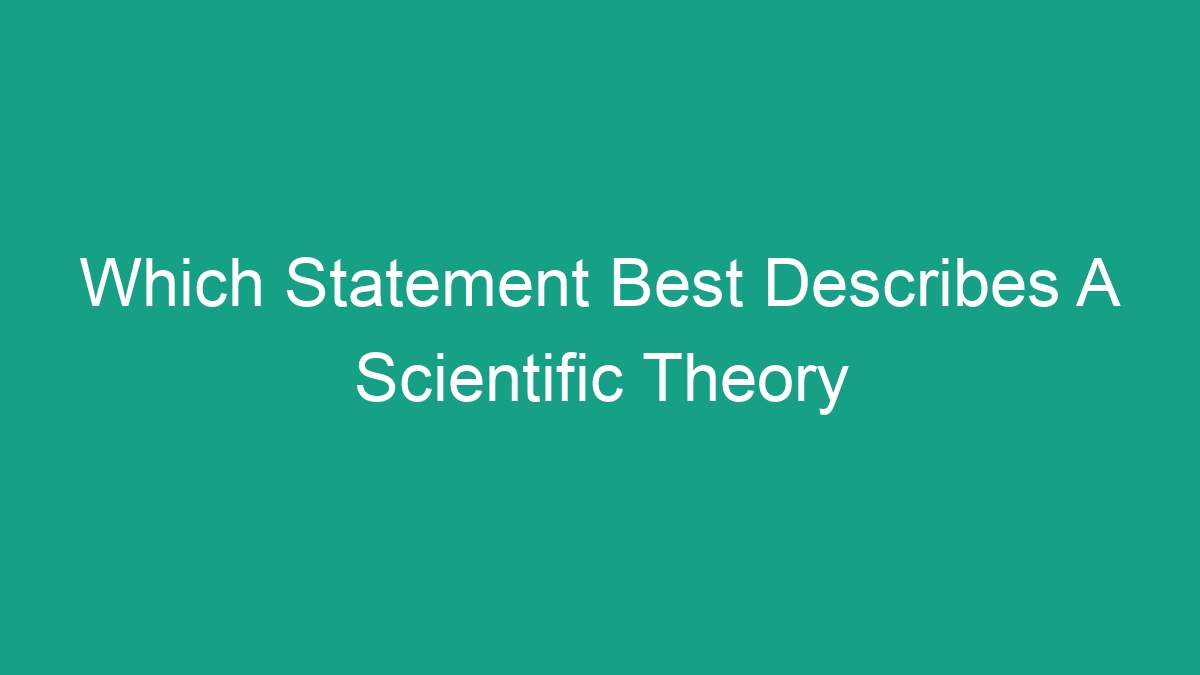
What is a Scientific Theory?
A scientific theory is an explanation of some aspect of the natural world that is substantiated through repeated experiments or observations. It is a well-substantiated explanation of some aspect of the natural world that is acquired through the scientific method and repeatedly tested and confirmed through observation and experimentation. It is a framework that has been developed to explain some aspect of the natural world, and is generally backed up by evidence gathered through the scientific method.
Characteristics of a Scientific Theory
- Testable: A scientific theory must be testable using the scientific method, meaning that it can be subjected to experiments that can either support or refute it.
- Falsifiable: It must be potentially falsifiable through empirical observations. This means that there must be a way to demonstrate that the theory is false if it does not accurately describe the natural world.
- Explanatory: A scientific theory must provide an explanation for a particular phenomenon or set of phenomena.
- Predictive: It must make testable predictions about the natural world based on existing knowledge and evidence.
- Consistent: A scientific theory should be consistent with existing empirical data and other theories in the same field.
How is a Scientific Theory Different from a Scientific Law?
It is important to note that a scientific theory is different from a scientific law. A scientific law describes a phenomenon that has been observed to occur consistently, and is often expressed as a mathematical equation. For example, Newton’s law of universal gravitation describes the attraction between two objects with mass. On the other hand, a scientific theory is an explanation for why and how a phenomenon occurs. For example, the theory of evolution by natural selection explains how species change over time through the process of natural selection.
Examples of Scientific Theories
There are numerous scientific theories that have been well-established through the scientific method and have withstood the test of time. Some examples include:
- Cell Theory: The theory that all living organisms are composed of cells, the basic unit of life.
- Atomic Theory: The theory that all matter is composed of indivisible particles called atoms.
- Theory of Relativity: Albert Einstein’s theory that describes the relationship between space, time, and gravity.
- Quantum Theory: The theory that describes the behavior of particles at the subatomic level.
- Plate Tectonics Theory: The theory that explains the movement of the Earth’s lithosphere and its impact on geological phenomena.
How Scientific Theories are Developed
The development of scientific theories generally follows a series of steps, including:
- Observations: Scientists make observations of natural phenomena and identify patterns or inconsistencies.
- Hypothesis Formulation: Scientists formulate a hypothesis, or a proposed explanation for the observed phenomena, based on existing knowledge and evidence.
- Testing: The hypothesis is tested through experiments, observations, and data collection to determine its validity.
- Evaluation: The results of the tests are evaluated to determine if they support or refute the hypothesis.
- Peer Review: The hypothesis and supporting evidence are reviewed by other scientists in the field to ensure that the methods and conclusions are sound.
- Theory Formation: If the hypothesis is consistently supported by evidence and withstands peer review, it may be developed into a scientific theory.
Common Misconceptions about Scientific Theories
Despite the rigorous process through which scientific theories are developed, there are several common misconceptions about what constitutes a scientific theory. Some of these misconceptions include:
- Equating Theory with Opinion: Some people mistakenly believe that a theory is simply an opinion or speculation, when in fact it is a well-substantiated explanation based on empirical evidence.
- Believing Theories are Unchangeable: Many people think that once a theory is established, it can never be changed or modified. The reality is that scientific theories are constantly refined and updated as new evidence emerges.
- Confusing Theory with Hypothesis: There is often confusion between a scientific theory and a hypothesis. A hypothesis is a proposed explanation for a specific phenomenon, while a theory is a well-substantiated explanation that has been confirmed through repeated testing and observation.
FAQs
Q: Can a scientific theory be proven true?
A: No, a scientific theory cannot be proven true. It can only be supported by existing evidence and withstand attempts at falsification through experimentation and observation. It is always subject to change based on new evidence or discoveries.
Q: Are scientific theories always correct?
A: While scientific theories are well-substantiated explanations for natural phenomena, they are not infallible. Theories are constantly evaluated and refined as new evidence and knowledge emerge, and in some cases, they may be replaced by more accurate explanations.
Q: Is a theory just a guess?
A: No, a scientific theory is not just a guess. It is supported by empirical evidence and has been tested and confirmed through the scientific method. It is a systematic and well-substantiated explanation for a particular aspect of the natural world.



